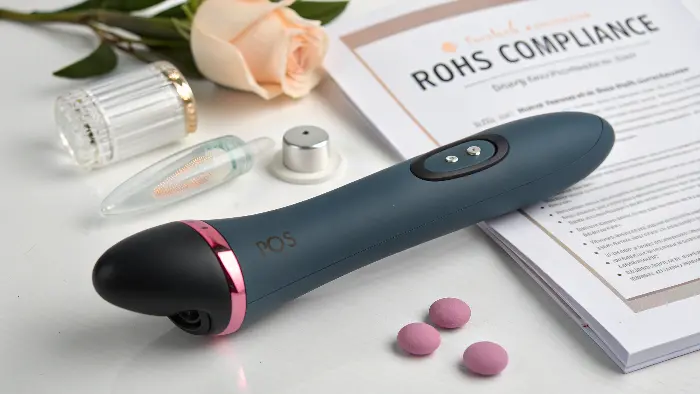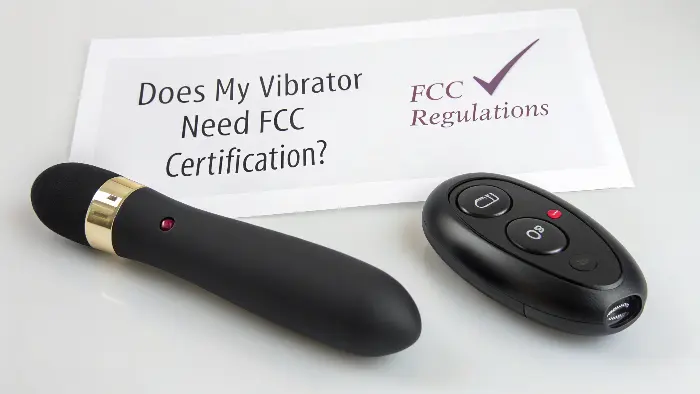Feeling overwhelmed by CE, RoHS, and FCC certifications for your adult toys? It’s a complex world, and mistakes can be costly. What if you miss something vital?
CE, RoHS, and FCC are key certifications ensuring your adult toys meet safety, material, and electronic interference standards for markets like Europe (CE, RoHS) and the USA (FCC). They are crucial for legal sales, customer trust, and brand reputation.
Let’s be honest, talking about certifications isn’t exactly the sexiest part of the adult toy business. But, as a brand owner with PrivyPlay, I can tell you firsthand – this stuff is critical. If you’re an e-commerce entrepreneur, a purchasing manager, or a wellness brand founder looking to source or sell adult toys, understanding these acronyms is non-negotiable. It’s about more than just ticking boxes; it’s about safety, market access, and building a brand that people trust. So, grab a coffee, and let’s dive into what these certifications mean for your products and your peace of mind. It’s less scary than it sounds, I promise!
What Exactly is CE Marking and Why Should My Adult Toys Have It?
You see that "CE" logo everywhere, but what does it actually mean for your pleasure products? Is it just another piece of red tape, or is there a real benefit for your brand and your customers when selling adult toys?
CE marking signifies conformity with European Union health, safety, and environmental protection standards. For adult toys sold in the EEA, it’s often mandatory, demonstrating your product meets essential requirements and can be legally sold.
Alright, let’s demystify CE marking. "CE" stands for "Conformité Européenne," which is French for "European Conformity." When I first started looking to expand PrivyPlay into the European market, this was one of the first big hurdles we had to understand. It’s not a quality mark issued by an EU body, but rather a declaration by the manufacturer (that’s you, or us if we’re making it for you!) that the product meets all relevant EU directives and regulations. Think of it as a passport for your product to enter and move freely within the European Economic Area (EEA) – that’s all EU countries plus Iceland, Liechtenstein, and Norway. That’s a huge market! For adult toys, especially those with electronic components or that come into direct skin contact, several directives can apply. These often include the Low Voltage Directive (LVD) for electrical safety if your toy plugs in or recharges, the Electromagnetic Compatibility (EMC) Directive to ensure it doesn’t interfere with other devices (and isn’t susceptible to interference itself), and very importantly, RoHS, which we’ll talk more about. Sometimes, the General Product Safety Directive (GPSD) also comes into play. I remember when we were developing our [WhisperWave Wand – placeholder], we had to compile a detailed technical file – test reports, design schematics, risk assessments – all to support our CE declaration. It was a process, for sure, but knowing our product met these standards was crucial for our "Elevating Pleasure, Empowering Confidence" mission. Without CE marking, your toys can be stopped at customs, you could face fines, or even be forced to recall products. It’s serious stuff, but absolutely essential for tapping into that lucrative European market.
Is RoHS Compliance Really Necessary for My Adult Toy Materials?
You’re focused on body-safe silicone and quality motors, but then someone mentions "RoHS." Is this another complicated rule, or is it genuinely vital for the safety and quality of the adult toys you’re putting your brand name on?
RoHS (Restriction of Hazardous Substances) compliance is crucial for adult toys, especially those with electronics, as it limits harmful materials like lead and cadmium. It ensures consumer safety, environmental protection, and is often required for CE marking.

Let’s talk RoHS. This one is super important, especially in our industry where products have intimate contact with the body. RoHS stands for "Restriction of Hazardous Substances." Essentially, it’s an EU directive (though many regions worldwide have adopted similar standards) that restricts the use of specific hazardous materials found in electrical and electronic products. We’re talking nasty stuff like lead, mercury, cadmium, hexavalent chromium, and flame retardants like PBBs and PBDEs. More recently, four types of phthalates were added to the list, which is particularly relevant for us given the materials common in adult toys. Why is this so critical for adult toys? Well, many toys have electronic components – motors, batteries, charging ports. And even the non-electronic parts, like certain plastics or coatings, could potentially contain these restricted substances if you’re not careful with your sourcing. For PrivyPlay, ensuring RoHS compliance is a non-negotiable part of our commitment to quality and safety. I mean, our slogan is "Elevating Pleasure, Empowering Confidence." How can our customers feel confident if there’s any doubt about the materials they’re using so intimately? I remember one sourcing challenge we faced early on; a supplier for a small component offered a slightly cheaper version. When we dug deeper, it turned out it wasn’t RoHS compliant. We immediately rejected it. Saving a few cents is never worth compromising on safety or our brand’s integrity. For many adult toys, RoHS compliance is actually a prerequisite for affixing the CE mark. So, if you’re aiming for the EU market, RoHS is part of that journey. It’s about protecting your customers, the environment, and your brand’s reputation. It’s just good business.
Does My Vibrator Need FCC Certification, and What Does That Even Mean?
Your new vibrator has Bluetooth, or maybe just a simple motor. Then you hear about "FCC." Does this US-based regulation apply to adult toys, and what exactly does it mean for your product development and market access?
Yes, many adult toys, especially those with electronic motors, wireless remotes, or Bluetooth, need to comply with FCC (Federal Communications Commission) regulations in the USA. This ensures they don’t cause harmful electromagnetic interference.

| Okay, shifting gears to the US market, let’s talk about the FCC – the Federal Communications Commission. If your adult toy is electronic, there’s a very good chance FCC rules apply to you. The FCC regulates all devices that emit radio frequency (RF) energy to ensure they don’t cause harmful interference to radio services or other electronic devices. You might think, "It’s just a vibrator, what’s the big deal?" But even a simple motor can generate unintentional RF emissions. And if your toy has intentional radiators, like Bluetooth for app control or a wireless remote, then FCC certification becomes even more stringent. For PrivyPlay, when we developed our first app-controlled toy, the [AuraConnect G-Spot Vibrator – placeholder], navigating FCC requirements was a key part of the process. We had to ensure it complied with FCC Part 15. Devices are generally split into "unintentional radiators" (like a basic motor) which might fall under FCC Part 15B and often require a process called Verification or a Supplier’s Declaration of Conformity (SDoC), and "intentional radiators" (like Bluetooth or Wi-Fi) which fall under FCC Part 15C and usually require full Certification through an FCC-recognized Telecommunication Certification Body (TCB). This involves rigorous testing in an accredited lab. It definitely adds to the development timeline and cost – no sugarcoating that. I remember the first time we sent a prototype for FCC testing; holding our breath until we got the pass report! But selling in the US without this? You risk your products being seized, fines, or even a sales ban. Plus, it’s about being a responsible manufacturer. You don’t want your toy to be the reason someone’s Wi-Fi keeps dropping! Here’s a quick look: |
Device Feature in Adult Toy | Likely FCC Part | Common Compliance Route |
|---|---|---|---|
| Basic electric motor (no wireless) | Part 15B | SDoC / Verification | |
| Bluetooth connectivity | Part 15C | Certification | |
| Wireless remote control (RF) | Part 15C | Certification | |
| USB Rechargeable (no other electronics) | Part 15B | SDoC / Verification (for charging circuit) |
It’s essential to get this right for the US market.
How Do These Certifications Really Impact My Market Access and Brand Reputation?
You understand what CE, RoHS, and FCC are, but what’s the bottom line? How do these little logos truly affect your ability to sell your adult toys and how customers see your brand in this competitive market?
Certifications like CE, RoHS, and FCC are gatekeepers to major markets (EU, USA), ensuring legal compliance. They also significantly boost brand reputation by demonstrating a commitment to safety, quality, and consumer trust, which is invaluable.

So, let’s bring it all together. Why should you, as a brand owner or sourcing manager, really care about CE, RoHS, and FCC? It boils down to two massive things: market access and brand reputation. First, market access. CE marking is your key to the entire European Economic Area. Without it, forget selling legally in those ~30 countries. Your shipments could be impounded, you could face hefty fines – it’s a non-starter. I recall a story from an industry colleague whose first shipment to Germany got stuck in customs for weeks due to incomplete CE documentation. A total nightmare that cost them thousands and nearly sank their launch. Similarly, for the US market, if your electronic adult toy isn’t FCC compliant, you’re risking enforcement actions. These certifications are literally your license to operate in these huge, lucrative markets.
Then there’s brand reputation, which, in my book, is priceless. In the adult products industry, trust is paramount. Customers are using these products intimately. They need to feel safe and confident. Displaying recognized certifications like CE, showing RoHS compliance for materials, and ensuring FCC for electronics tells your customers – and your B2B partners – that you are serious about safety and quality. It says, "We’ve done our due diligence." For PrivyPlay, this is a core part of our "Elevating Pleasure, Empowering Confidence" promise. It helps us stand out from brands that might cut corners. I’ve had potential retail partners specifically ask for our certification documents before even discussing orders. It’s a credibility builder. These certifications aren’t just bureaucratic hoops; they are investments in your brand’s longevity and trustworthiness. They reduce risks of recalls, legal issues, and damage to your hard-earned reputation. Think of them as a shield and a badge of honor. They protect your business and signal to the world that you’re a responsible, quality-focused player in the adult wellness space. 🔥
Conclusion
CE, RoHS, and FCC certifications aren’t just red tape for adult toys. They are essential for legal market access, crucial for consumer safety, and fundamental for building a trustworthy, reputable brand in the global adult products market.
